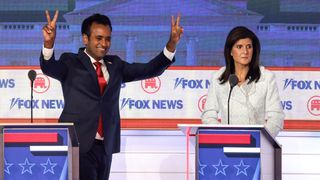When it comes to the Republication presidential debates, it appears you don’t need to be in it to win it. While he wasn’t on stage for the first debate, Donald Trump, of all the Republican candidates, has experienced the greatest bump in national polls (+3.5 per cent) since 24 August. It is a remarkable feat considering the former president had his mugshot taken the very next day.
Few other candidates have experienced any compelling change to their chances since their first showdown, according to national polling averages, with Nikki Haley being the only other candidate to gain notable ground in the last month and ‘non-Trump’ pack leader Ron DeSantis slowly declining in popularity.
All this might lead to the question of whether these debates really accomplish much at all for the vying candidates’ chances at securing the top spot. Some might think it would be even better for the 2024 hopefuls to sit this one out and allow the remaining candidates to risk a gaffe or to weather each other’s insults (Chris Christie saying Ramaswamy “sounds like ChatGPT” was a particularly memorable blow in the first debate).
If Donald Trump is going to win the nomination anyway, or so it seems, why bother showing up for the debate at all?
Donald Trump might have an intimidating and consolidated lead over the rest of the candidates, but until voters go to ballot boxes and the other candidates withdraw, the race is not over yet. Trump’s lead in early states, like Iowa, sits beneath 50 per cent – his support amongst Republicans in these states is not quite as significant as national polls (currently above 60 per cent) would imply. The former president also faces significant scheduling issues, facing several trials around key dates in the primary season next year; for now, Trump is set to face a defamation case in January just before the Iowa caucus, two major trials in March around Super Tuesday and a federal criminal trial in May.
The race is not over. So, this next debate offers invaluable airtime before American voters (nearly 13 million watched the first debate) and a live microphone to make each candidate’s agenda, leadership potential and name known; and maybe even attract some swing voters or, better yet, donors.
The first few Republican state primaries will inevitably narrow the field, which might just make it easier to consolidate support from ‘Never Trumpers’ (around 25 per cent of Republican primary voters) and some of those open to a Trump alternative (around 35 per cent), whose support is currently split between the many non-Trump candidates. These debates are a great opportunity for candidates to show how they might lead the United States in a way that is different or better than Trump, as well as to distinguish themselves from the others in the race.
For those still hoping to be Trump’s right hand, the debate requires a whole different strategy – not one of emphasising their difference, but one that highlights their similarity. While several of the candidates are unlikely to secure positions as vice president (like Mike Pence, Doug Burgum or Chris Christie), the debate is a chance to sample whether the cause and style of any of these candidates is viable for a Trump running-mate.
While a victory in the Republican primary race might feel far off, these candidates have to be in it to win it. Beyond the chance to hurl witty one-liners at rivals, the debate will only help these 2024 hopefuls stay in the running.
This article was originally published as part of the weekly USSC newsletter, the 46th. Subscribe here.






